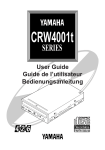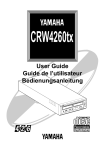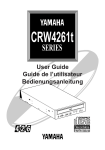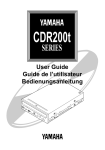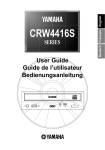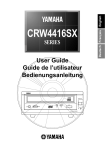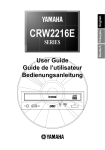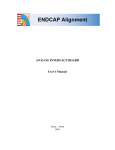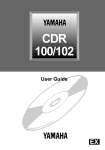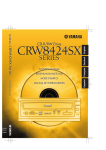Download Yamaha CRW4260t-B User guide
Transcript
CRW4260t SERIES User Guide Guide de I’utilisateur Bedienungsanleitung COMPLIANCE INFORMATION STATEMENT (DECLARATION OF CONFORMITY PROCEDURE) Responsible Party: Address: Telephone: FAX: Type of Equipment: Model Name: Yamaha Systems Technology, Inc. 100 Century Center Court San Jose, California 95112 (408) 467-2330 (408) 437-8791 CD Recorder CRW4260t-B CRW4260t-NB This device complies with Part 15 of the FCC Rules. Operation is subject to the following conditions: 1) this device may not cause harmful interference, and 2) this device must accept any interference received including interference that may cause undesired operation. See user manual instructions if interference to radio reception is suspected. FCC INFORMATION (U.S.A.) 1. IMPORTANT NOTICE: DO NOT MODIFY THIS UNIT! This product, when installed as indicated in the instructions contained in this manual, meets FCC requirements. Modifications not expressly approved by Yamaha may void your authority, granted by the FCC, to use the product. 2. IMPORTANT: When connecting this product to accessories and/or another product use only high quality shielded cables. Cable/ s supplied with this product MUST be used. Follow all installation instructions. Failure to follow instructions could void your FCC authorization to use this product in the USA. 3. NOTE: This product has been tested and found to comply with the requirements listed in FCC Regulations, Part 15 for Class “B” digital devices. Compliance with these requirements provides a reasonable level of assurance that your use of this product in a residential environment will not result in harmful interference with other electronic devices. This equipment generates/uses radio frequencies and, if not installed and used according to the instructions found in the users manual, may cause interference harmful to the operation of other electronic devices. Compliance with FCC regulations does not guarantee that interference will not occur in all installations. If this product is found to be the source of interference, which can be determined by turning the product “OFF” and “ON”, please try to eliminate the problem by using one of the following measures: Relocate either this product or the device that is being affected by the interference. Utilize power outlets that are on different branch (circuit breaker or fuse) circuits or install AC line filter/s. In the case of radio or TV interference, relocate/reorient the antenna. If the antenna lead-in is 300 ohm ribbon lead, change the leadin to coaxial type cable. If these corrective measures do not produce satisfactory results, please contact the local retailer authorized to distribute this type of product. If you can not locate the appropriate retailer, please contact Yamaha Systems Technology, Inc. 100 Century Center Court, San Jose, CA95112, U.S.A. • This manual applies to the CRW4260t-B and CRW4260t-NB. The CRW4260t-B front panel displays the YAMAHA brand name. The CRW4260t-NB front panel does not display a brand name. Laser Diode Properties Material : GaAlAs Wavelength : 782-789 nm Emission Duration : Continuous Laser Output Power : Less than 44.6 µW* * This output is value measured at a distance 200mm from the objective lens surface on the optical pick-up block. ANSI Class : Class 1 CLASS 1 LASER PRODUCT LASER KLASSE 1 PRODUKT CAUTION Use of controls or adjustments or performance of procedures other than those specified herein may result in hazardous radiation exposure. This compact disc player is classified as a CLASS 1 LASER product. The CLASS 1 LASER PRODUCT label must be located on the exterior. VORSICHT : UNSICHTBARE LASERSTRAHLUNG WENN ABDECKUNG GEOFFNET. NICHT DEM STRAHL AUSSETZEN. VARNING : OSYNLIG LASERSTRÅLNING NÄR DENNA DEL ÄR ÖPPNAD OCH SPÄRREN ÄR URKOPPLAD. BETRAKTA EJ STRÅLEN ÄR FARLIG. VARO! : AVATAESSA JA SUOJALUKITUS OHITETTAESSA OLET ALTTINA NÄKYMÄTTÖMÄLLE LASERS TEILYLLE. ÄLÄ KATSO SÄTESSEN. ADVARSEL : USYNLIG LASERSTRALNING VED ÅBNING NÄR SIKKERHETSAFBYDERE ER UDE AF FUNKTION. UNDGÅ UDSETTELS FOR STRÅLING. Varningsanvisning för laserstrålning. WARNING ❢ WARNING ❢ • The temperature where CRW4260t is located should be between 5ºC and 40ºC (41ºF – 104ºF), when used in a fan-cooled system. • Do not disassemble the CRW4260t cover to reduce the risk of electric shock. • Always remove the disc before transporting CRW4260t. i Important Precautions Important Precautions Please read the following precautions before attempting to operate the CRW4260t. • Before recording a disc, be sure to clean the disc and tray using an air aerosol-type dust remover. A dust particle on the disc may cause recording to fail, producing an unusable disc. • Always record in a dust-free environment. If the disc must be removed from the CRW4260t before recording is finished, store the disc in a clean, dust-free environment. • The CRW4260t contains no user serviceable parts. Refer all servicing to qualified personnel. • If any of the following should occur, the CRW4260t should be serviced by qualified personnel: Metal objects or liquids get inside the CRW4260t. The CRW4260t does not operate normally or a marked change in performance is noticed. • Do not place heavy objects on the CD-RW discs. • Do not subject the CRW4260t and computer to impact or shock when in use, as this may impair recording or playback. • Yamaha is not responsible for any data or information losses resulting from the operation of the CRW4260t. ii Table of Contents Table of Contents Introduction ............................................................................. 1 CRW4260t Features ...................................................... 1 Orange Book Compatible Recording ............................ 2 Chapter 1 - System Configuration ..................................... 3 Computer ....................................................................... 3 Software......................................................................... 3 Tools .............................................................................. 4 Discs .............................................................................. 4 Chapter 2 - Installing the Yamaha CRW4260t Chapter 2 - Drive ..................................................................... 5 CRW4260t drive settings............................................... 5 Installing the CRW4260t drive...................................... 8 Chapter 3 - Operation .......................................................... 13 Front Panel................................................................... 13 Loading a Disc............................................................. 14 Ejecting the Disc.......................................................... 15 Manual Eject (emergency use) .................................... 16 Troubleshooting ................................................................... 17 Appendix................................................................................. 18 Specifications............................................................... 18 Front Panel Indicator Key............................................ 19 ©1997 Yamaha Corporation. All Rights Reserved. This document may not, in whole or in part, be copied, photocopied, reproduced, translated, transmitted or reduced to any electronic medium of machine readable form without prior consent in writing from Yamaha. MS-DOS and Windows are registered trademarks of Microsoft, Inc. Unix is a registered trademark of UNIX System Laboratories. All other trademarks are the property of their respective companies. iii Introduction Introduction Thank you for purchasing a Yamaha CRW4260t drive. Please read this manual before using the drive in order to make the best use of the superior CRW4260t functions. After reading, please retain this manual for future reference. CRW4260t Features ■ 2xS Recording (Rewritable) - 4xS Recording (Recordable) 6xS Reading The CRW4260t is able to write (overwrite) CD-RW discs at double speed, and is able to write CD-R discs at quad speed, double speed, or normal speed. For both types of media, this drive is able to read at 6X speed, quad speed, double speed, or normal speed, and any of these modes can be selected as desired. ■ Compatible with Seven Different Formats The CRW4260t can both record and read seven different formats: CD-ROM, CD-ROM XA, CD-I, CD-DA, CD-Bridge (multisession), CDExtra, and Video CD. The CRW4260t is also equipped with an analog audio output terminal (headphones) for CD-DA. ■ SCSI 2 for High-Volume, High-Speed Data Transfer The CRW4260t features SCSI 2, the second generation SCSI interface for connecting computers and peripheral devices. ■ Compatible with Windows 95 Plug and Play SCSI IDs are set automatically by the SCAM protocol (level 1). ■ Orange Book Part 2, Part 3 Compatible 5-Mode Recording The CRW4260t conforms to the five recording modes outlined in the Orange Book Part 2 and Part 3: Track at Once, Multisession, Disc at Once, Session at Once, and Packet Writing. 1 Introduction Orange Book Compatible Recording Track at Once In this mode, data can be recorded to disc one track at a time. Discs recorded in this mode cannot be played in CD players or CD-ROM drives other than a CD-RW or CD-R drive until the session is closed. Multisession In this mode, data can be recorded to disc in stages (one session at a time). Additional data can be written later. Disc at Once In this mode, data can be recorded to an entire disc in one pass. It is not possible to write additional data later. Session at Once In this mode, data can be recorded to disc one session at a time. To use this mode, your software must support Session at Once recording. New sessions can be written later. Packet Writing This is useful for data back-up. Smaller units of data can be added to tracks. To use this mode, your software must support Packet Writing. The CRW4260t supports both sequential and random packet writing. 2 Chapter 1 - System Configuration Chapter 1 - System Configuration Before using the CRW4260t, make sure that you have all of the items on the list of included items. In order to use the CRW4260t, you will require the following. Computer The following operating environment is required: • An IBM/AT compatible computer with a 100 MHz or faster Pentium CPU (in order to write at 4x speed), or a 100 MHz or faster 486 CPU (in order to write at 2x speed) • A vacant slot in which to install a SCSI card or a pre-installed SCSI card • A vacant half-height bay • Windows 3.1, Windows 95, Windows NT4.0 or Higher • Sufficient hard disk space Note: You will need about twice as much space on your hard disk as that required by the data you wish to write to CD-ROM. SCSI card This is required in order to connect a SCSI device (the Yamaha CRW4260t) to your computer. We recommend the following: Adaptec SCSI cards: AHA-2940 (PCI), AHA-284x (VL), AHA-2740 (EISA), AHA-154x (ISA), etc. Software Use writing software or packet writing software which supports the CRW4260t. 3 Chapter 1 - System Configuration Tools • Phillips screwdriver This is used to remove the cover of your computer, and to install the Yamaha CRW4260t drive. • Phillips screwdriver Long nose pliers These are used to insert or remove the jumper pin when setting the SCSI ID and parity settings etc.of the Yamaha CRW4260t drive. Long nose pliers Discs On the CRW4260t, you can use conventional CD-RW and CD-R discs that conform to the Recordable Compact Disc Systems Part 2 and Part 3 (Orange Book). Yamaha recommends the following Yamaha CD-RW and CD-R discs: CD-RW Discs > CRWM74R (φ120mm, 74 minutes) CD-R Discs > CDM12Y63 > CDM12Y74 > CDM12Y74M > CDM12Y74T (φ120mm, 63 minutes) (φ120mm, 74 minutes) (φ120mm, 74 minutes) (φ120mm, 74 minutes) Read-only Discs You can use discs with the logo which conform to the Compact Disc Read Only Memory standard (CD-ROM standard, Yellow Book). If you wish to use the audio functions, use discs with the logo, which conform to the Compact Disc Digital Audio standard (Red Book). 4 Chapter 2 - Installing the Yamaha CRW4260t Drive Chapter 2 - Installing the Yamaha CRW4260t Drive CRW4260t drive settings Before installing the CRW4260t in your computer, you will need to set the following jumpers. You set these jumpers by inserting jumper connectors into the jumper switch located on the rear panel of the CD-RW drive. ♦ ♦ ♦ ♦ SCSI ID settings Parity setting Terminator setting Block size setting Important: Use long-nose pliers to remove or insert jumper connectors. In the diagrams in this manual, solid black fill is used to indicate locations where a jumper is used to short between pins. Rear Panel VZ49890-0 VZ49880-0 AUDIO OUT R G L 124 ID SELECT PARITY TERMINATOR BLOCK SIZE SCSI INTERFACE CONNECTOR 1 DC INPUT + 5V G +12V Jumper Switch ♦ SCSI ID settings The SCSI ID number is used so that the computer will recognize a connected SCSI device. You can assign 0 through 7 as the SCSI ID number. Usually, “7” is reserved for the SCSI card ID number, and “0” is reserved for the first SCSI device in the chain. Use a number between 1 and 6 for the CRW4260t. Refer to the diagram below for more information on setting the SCSI ID number. The factory set ID number is “3”. Important: If you are using other SCSI devices, be sure to use a unique ID number for each device. 5 Chapter 2 - Installing the Yamaha CRW4260t Drive Note: When you are using Windows 95, and if the SCSI ID setting on the rear panel is the same as the number assigned to another SCSI device, the Plug and Play component of Windows 95 will automatically assign an unused number to the CRW4260t (SCAM protocol level 1). SCSI ID Setting 124 124 1 2 4 1 2 4 SCSI ID 0 SCSI ID 1 SCSI ID 2 SCSI ID 3 124 124 1 2 4 1 2 4 SCSI ID 4 SCSI ID 5 SCSI ID 6 SCSI ID 7 * Use jumper connectors to short the locations shown in black. ♦ Parity setting Parity ON (with a jumper) — Parity Check will be performed. Normally, use this setting. Parity OFF (without a jumper) — Parity Check will not be performed. Parity ON 124 Parity OFF ID SELECT PARITY TERMINATOR BLOCK SIZE 124 ID SELECT PARITY TERMINATOR BLOCK SIZE * Use jumper connectors to short the locations shown in black. 6 Chapter 2 - Installing the Yamaha CRW4260t Drive ♦ Terminator setting The terminator setting indicates whether or not this device is the last connected SCSI device. Terminator ON (with a jumper) — Use this setting if the CRW4260t is the last device in the internal SCSI daisy-chain. Terminator OFF (without a jumper) — Use this setting if devices other than the CRW4260t are in the internal SCSI daisy-chain and the CRW4260t is not the last device. Terminator ON 124 Terminator OFF ID SELECT PARITY TERMINATOR BLOCK SIZE 124 ID SELECT PARITY TERMINATOR BLOCK SIZE * Use jumper connectors to short the locations shown in black. ♦ Block size setting Block size ON (with a jumper) — Block Size is set to 512Byte/sector. This function is valid only for workstations, such as those that run UNIX. Block size OFF (without a jumper) — Normally, use this setting. Block size ON 124 Block size OFF ID SELECT PARITY TERMINATOR BLOCK SIZE 124 ID SELECT PARITY TERMINATOR BLOCK SIZE * Use jumper connectors to short the locations shown in black. 7 Chapter 2 - Installing the Yamaha CRW4260t Drive Installing the CRW4260t drive The following steps will differ slightly depending on the type of computer you are using. For details on removing the cover from your computer, and installing or removing internal devices, refer to the manual for your computer. 1. Switch off your computer, and unplug it from the AC outlet. If you fail to do this, there is a danger of electric shock and/or of causing short circuits, which may damage the computer and/or CRW4260t drive. OFF PUSH 2. Remove the cover from your computer. Be careful not to lose the screws that were removed. 3. Your hands or body may be holding a charge of static electricity. Touch a metallic portion of the chassis or power supply to release any such charge. 8 Chapter 2 - Installing the Yamaha CRW4260t Drive 4. Remove the front cover of a vacant half-height drive bay. For details refer to the manual of your computer. 5. Remove the SCSI card, and set the terminator setting of the SCSI internal circuit to the position for internal connected devices. For details refer to the manual of your SCSI card. 6. Slide the CRW4260t drive into the drive bay from the front. At this time, be careful not to apply excessive force to the drive itself. Finger-tighten the four fastening screws, and check that there is enough room to connect the power supply cable, SCSI cable, and AUDIO cables. 7. Connect the SCSI flat cable. Connect the 50-pin SCSI flat cable to the SCSI card and to the SCSI interface located on the rear panel of the CRW4260t drive. Position the connector so that the colored line is at pin 1 (your lower right). 9 Chapter 2 - Installing the Yamaha CRW4260t Drive VZ49 880-0 PUT SCSI ACE DC IN RF INTE ECTOR +12V CONN G VZ49 AUD IO O UT L RG 1 CT ELE ID S Y IT PAR INATOR M TER K SIZE C BLO 880-0 +5V 124 8. Connect the AUDIO cable. Connect the single 4-pin connector (Sound Blaster compatible) to the sound card. Connect the 4-pin connector at the other end of the cable (the larger connector) to the AUDIO OUT connector on the CRW4260t drive. The polarizing lug should be at the top. VZ49 880-0 PUT SCSI ACE DC IN RF INTE ECTOR +12V CONN G VZ49 880-0 AUD IO O UT L RG 1 CT ELE ID S Y IT PAR INATOR M TER K SIZE C BLO +5V 124 AUDIO cable To the CRW4260t 4-pin connector (large) To the CDR100/102 (3-pin connector) * Simultaneous use with the CRW4260t is not possible. To the Sound Card (Sond Blaster compatible) 4-pin connector (small) 10 Chapter 2 - Installing the Yamaha CRW4260t Drive 9. Connect the power supply cable. Connect the +12V and +5V 4-pin power cable to the power supply interface located on the rear panel of the CRW4260t drive. The shape of the connector makes it impossible to reverse the connections. VZ49 880-0 PUT SCSI ACE DC IN RF INTE ECTOR CONN G 88 VZ49 AUD CT ELE ID S Y IT PAR INATOR M TER K SIZE C BLO 0-0 IO O UT L RG 1 +12V +5V 124 10. Tighten the four fastening screws securely. 11. Attach the cover of your computer. 11 Chapter 2 - Installing the Yamaha CRW4260t Drive 12. Connect the power cable to an AC outlet, and switch on your computer. Make sure that the LED located on the panel of the CRW4260t drive is lit. ON PUSH 13. Start up your operating system. For the procedure, refer to the manual for your operation system. 14. Install the writing software. For the installation procedure, refer to the manual for your writing software. 12 Chapter 3 - Operation Chapter 3 - Operation Front Panel 1 2 3 7 4 6 5 1 Disc tray The disc is inserted and ejected here. Pressing the eject button will open the tray. 2 Headphone jack This stereo mini jack allows you to connect headphones and listen to audio. 3 Headphone volume control This control adjusts the volume level of the headphone output. Rotating the control clockwise will increase the volume level. 4 ON/DISC LED This indicator lights up in orange when the CRW4260t is powered on, and lights up in green when the CRW4260t contains a disc. 5 READ/WRITE LED This indicator lights up in green when data is being read, and flashes when data is being accessed. It also lights up in orange when data is being recorded on a disc. 6 Eject button This button is used to open or close the tray. 7 Manual Eject hole This is used to manually eject a disc that cannot be ejected in the normal way. It is for emergency use only. 13 Chapter 3 - Operation Loading a Disc 1. Press the eject button to open the tray. 2. Carefully place the disc, label-side up, on the disc tray. 3. Press the disc tray softly or press the eject button again to close the disc tray. 14 Chapter 3 - Operation Ejecting the Disc If the CRW4260t is powered on: Press the eject button to eject the disc. Note: You cannot eject the disc if the SCSI command prohibits the eject operation while the CRW4260t is reading data. Caution: Be sure to remove the disc after it is completely ejected. (Trying to remove the disc before it is completely ejected may cause the drive to malfunction.) Press the eject button If the CRW4260t is not powered on: Pressing the eject button will not eject the disc. 15 Chapter 3 - Operation Manual Eject (emergency use) Here we explain how to eject the disc when it cannot be ejected in the normal way; for example, the power is shut off inadvertently or the loading mechanism fails. This technique should be used only as a last resort. Frequent use may lead to malfunction. You’ll need a pin-like object of 2 mm or less in diameter to do this. A straightened paper clip makes an ideal tool. 1. Insert the pin-like tool into the manual eject hole and push gently. The spring-loaded mechanism ejects the disc. 2. After manually ejecting a disc, you must turn off the power supplied to the CRW4260t, then turn it on before continuing. 16 Troubleshooting Troubleshooting If CRW4260t is not performing as expected, look up the symptoms in the following table, and take the appropriate corrective action. Symptoms Corrective action The power to the CRW4260t is off • Check the DC power cable connection. The power to the computer is off • Check to see if the SCSI card is correctly installed. The CRW4260t is not recognized by • Check the SCSI cable connection. the computer • Make sure that SCSI ID numbers are assigned exclusively. • Make sure that the last device in the SCSI daisy chain is terminated correctly. The CRW4260t does not operate correctly • Install the SCSI driver software again. The disc tray will not open • Make sure that the power to the drive is turned on. The disc ejects • Make sure that the disc is seated in the tray correctly. Incorrect operation • Make sure that the disc is seated in the tray correctly. • Make sure that you are using the correct disc. • Make sure that there is no dust, dirt, or condensation on the disc or tray. 17 Appendix Specifications Interface SCSI 2 Data Capacity 650MB (74 minutes) 550MB (63 minutes) Record/Read Speed Writing (CD-RW): 2X speed Writing (CD-R): Normal speed, 2X speed, 4Xspeed Reading: Normal speed, 2X speed, 4X speed, 6X speed Data Transfer Rate Burst Transfer Rate 6xS: 900KB/sec 4xS: 600KB/sec 2xS: 300KB/sec 1xS: 150KB/sec 4.2MB/sec (record asynchronous) 3.4MB/sec (read asynchronous) Buffer Size 2MB (500 sectors) Access Speed 250ms Installation Horizontal Disc Loading Tray Audio Out Frequency Response 20 - 20,000Hz (Line Out) (normal speed) Output Level 1 Vrms (Line Out) Power Consumption 11W (read/write) Power Supply 5V ±5%, 12V ±10% Environment Temperature: +5°C - +40°C (read/write, when used in a fan-cooled system) Humidity: 25 - 80% Dimensions (WxHxD) 146 x 41.3 x 193.1 mm (excluding front panel) Weight 950g Rear Panel Connector SCSI/Power Supply Non-shielded two-in-one, 50p + 4p ID Selector Short-pin 12p Audio Out MOLEX 53532-04 Specifications are subject to change without prior notice. 18 Appendix Front Panel Indicator Key ● on: green ✦ flashing: green ❍ on: orange ✧ flashing: orange — off ON/DISC Read/Write ❍➠— ❍➠— ❍ — Inserting disc ✦➠✧ — Ejecting disc ✧ — Ready (disc inserted) ● — Seeking ● ✦ Preparing to write ● ✧ Writing ● ❍ Writing (test mode) ● ✧ Playback ● ● Status Reset Ready (no disc) 19 English: If you have any questions, please contact your dealer or one of the following companies. French: Pour plus de détails sur les produits, veuillez vous adresser à Yamaha ou au distributeur le plus proche figurant dans la liste suivante : German: Bei weiteren Fragen wenden Sie sich Sitte an Ihren Händler oder eine der folgenden Firmen. JAPAN Yamaha Corporation Electronic Systems Division 203 Matsunokijima, Toyooka-mura, Iwata-gun, Shizuoka-ken, 438-01 JAPAN TEL: +81 539 62 3125 FAX: +81 539 62 5346 Internet: www.yamaha.co.jp U.S.A Yamaha Systems Technology, Inc. 100 Century Center Court, San Jose, CA 95112 U.S.A TEL: +1 408 467 2330 FAX: +1 408 437 8791 Internet: www.yamahayst.com CANADA GERMANY, SWITZERLAND, AUSTRIA, EASTERN EUROPE and RUSSIA Yamaha Europa GmbH Multi Media Division Siemensstrasse 22-34, D-25462 Rellingen, GERMANY TEL: +49 4101 303 200 FAX: +49 4101 303 277 Internet: www.yamaha-europe.com FRANCE Yamaha Musique France S.A. B.P. 70, 77312 Marne-la Vallée Cedex 2, FRANCE TEL: +33 1 6461 4060 FAX: +33 1 6461 4097 ITALY Yamaha Musica Italia s.p.a. Keyboard & Multimedia Division Viale Italia 88, 20020, Lainate (Milano) ITALY TEL: +39 2 935771 FAX: +39 2 9370956 SWEDEN and SCANDINAVIA Yamaha Canada Music Ltd. 135 Milner Avenue, Scarborough, Ontario M1S 3R1, CANADA TEL: +1 416 298 1311 FAX: +1 416 292 0732 Yamaha Scandinavia AB J A Wettergrens Gate 1, Box 300 53, S-400 43 Gothenburg SWEDEN TEL: +46 31 89 34 00 FAX: +46 31 45 96 07 Internet: www.yamaha.se UNITED KINGDOM, BENELUX, PORTUGAL, SPAIN, GREECE, CYPRUS, TURKEY and EGYPT SINGAPORE, MALAYSIA, INDIA, INDONESIA and PHILIPPINES Yamaha-Kemble Music (U.K.) Ltd. Media Technology Division Sherbourne Drive, Tilbrook, Milton Keynes MK7 8BL ENGLAND TEL: +44 1 908 366700 FAX: +44 1 908 368872 Yamaha Systems Technology, Singapore Pte Ltd. 138 Cecil Street, #03-01A Cecil Court, SINGAPORE 069538 TEL: +65 225 0050 FAX: +65 225 3669 YAMAHA CORPORATION Electronic Systems Division VZ54190-2 Printed in Japan


























